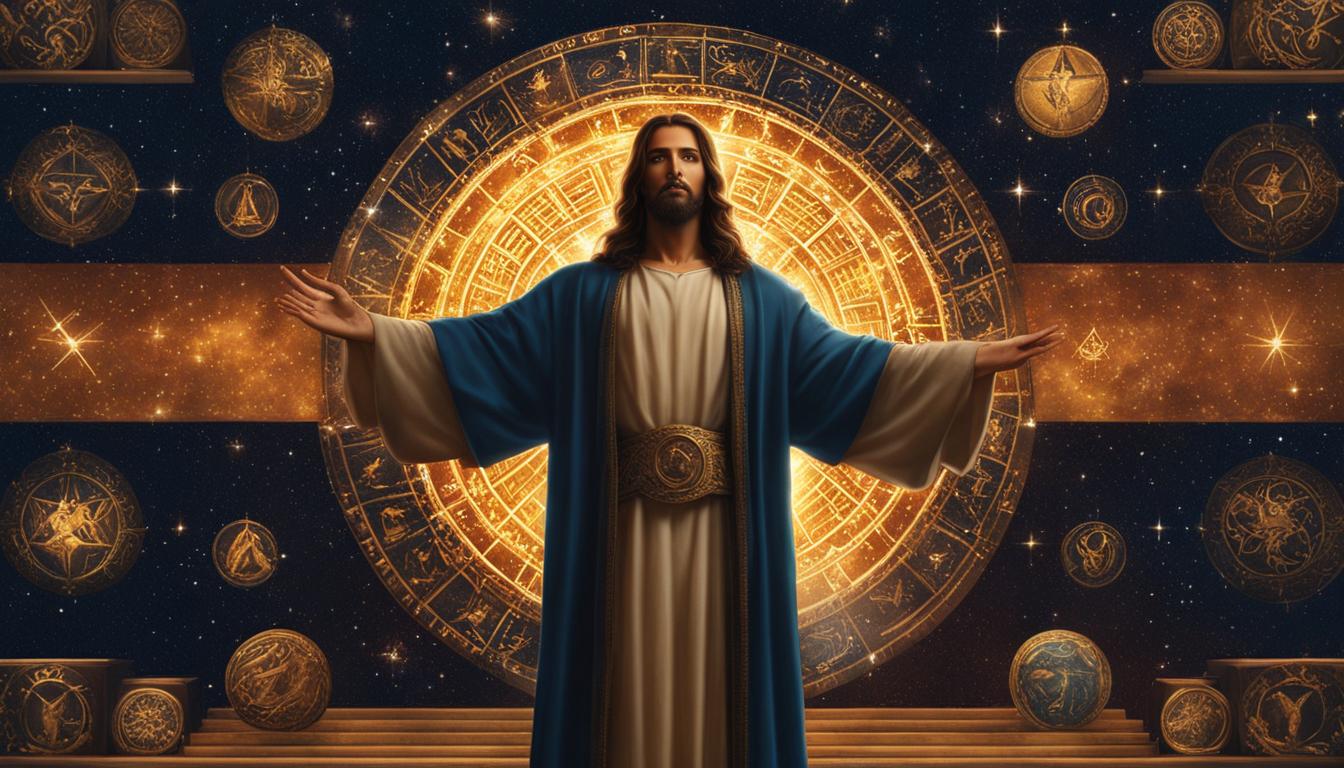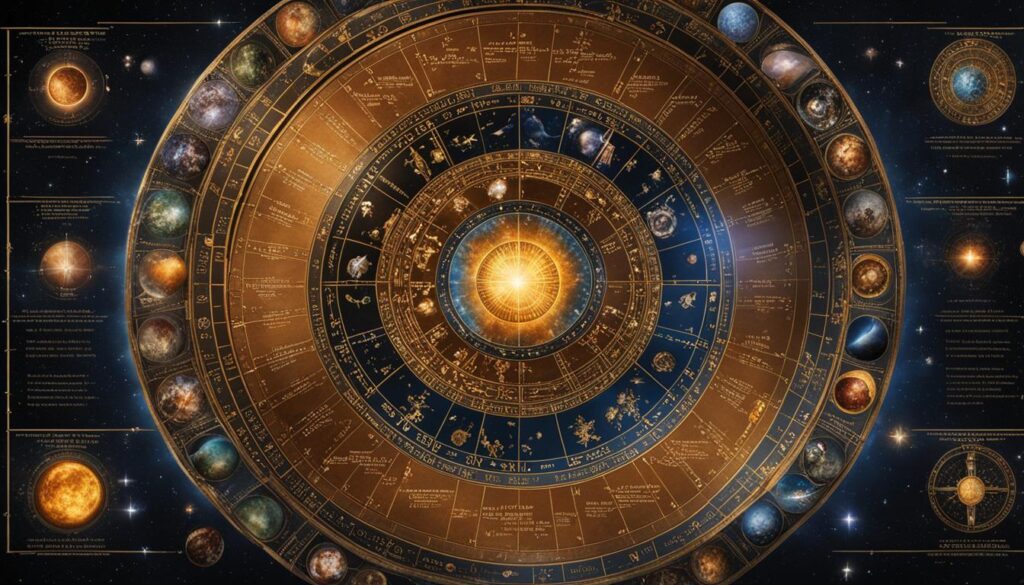Have you ever wondered about the astrological significance of Jesus? Can we determine his zodiac sign, analyze his birthdate, or explore his horoscope? These questions have sparked a fascinating debate, with some suggesting connections between Jesus and the Pisces zodiac sign.
According to Instagram user @revivalofwisdom, Jesus embodies astrological symbolism, with his 12 disciples representing the 12 zodiac signs. This theory also associates certain astrological events and the movement of the Sun with religious symbolism. However, it’s important to note that this theory is not widely supported by astrological schools of thought.
Key Takeaways:
- Some believe there are connections between Jesus and the Pisces zodiac sign.
- The theory suggests that Jesus’ 12 disciples represent the 12 zodiac signs.
- Astrological events and the movement of the Sun are associated with religious symbolism.
- This theory is not widely supported by astrological schools of thought.
- The debate surrounding Jesus’ astrological significance continues.
The Astrological Interpretation of Jesus’ Disciples
According to the astrological theory proposed by Instagram user @revivalofwisdom and other astrologers, each of Jesus’ disciples can be associated with specific zodiac signs, adding an intriguing astrological element to the biblical narrative. This interpretation suggests that the disciples embody the characteristics and traits of their respective zodiac signs, highlighting the diverse personalities within Jesus’ inner circle.
In this astrological interpretation, Peter is linked to the zodiac sign Aries, symbolizing his bold and assertive nature. Simon is associated with Taurus, representing his steadfastness and determination. James the lesser corresponds to Gemini, indicating his communicative and versatile qualities. Andrew is connected to Cancer, symbolizing his nurturing and protective instincts. John is portrayed as a Leo, reflecting his leadership and passionate nature. The list goes on, with each disciple aligning with a specific zodiac sign.
This astrological perspective invites us to explore the biblical narrative in a different light, considering the unique astrological influences that may have shaped the lives and personalities of Jesus’ disciples. It adds yet another layer of complexity and depth to the timeless story, encouraging further contemplation and exploration.
“The astrological interpretation of Jesus’ disciples offers a fascinating perspective, connecting celestial influences with the individuals who walked alongside Jesus. It reminds us of the multifaceted nature of humanity and invites us to consider the intersection of astrology and spirituality in our interpretation of biblical texts.
The Astrological Interpretation of Jesus’ Disciples
| Disciple | Zodiac Sign |
|---|---|
| Peter | Aries |
| Simon | Taurus |
| James the lesser | Gemini |
| Andrew | Cancer |
| John | Leo |
| … | … |
Table: Astrological association of zodiac signs with Jesus’ disciples, according to the astrological interpretation proposed by @revivalofwisdom and other astrologers.
The Symbolism of the Sun and the Son
In the astrological theory discussed by @revivalofwisdom, Jesus is equated with the Sun, representing light, warmth, and life. This symbolism links Jesus to the concept of the Son of God, further emphasizing his divine nature. The theory suggests that Jesus’ role as the Son mirrors the life-giving power of the Sun, highlighting the spiritual significance of his existence.
Throughout history, the sun has been a powerful symbol in various religious and spiritual beliefs. It is often associated with qualities such as enlightenment, illumination, and transcendence. In the case of Jesus, the comparison to the sun underscores his role as a spiritual guide, bringing light and salvation to humanity.
Furthermore, the notion of Jesus as the Son has deep biblical roots. In Christian theology, Jesus is referred to as the Son of God, emphasizing his unique relationship with the divine. This spiritual interpretation aligns with the astrological theory proposed by @revivalofwisdom, which draws parallels between the qualities of the Sun and the significance of Jesus as the Son of God.
“Just as the Sun provides light and life to all living beings on Earth, Jesus is believed to bring spiritual illumination and eternal life to all who believe in him.”
This spiritual interpretation adds a layer of symbolism to the understanding of Jesus’ significance and highlights the multifaceted nature of religious beliefs. It invites individuals to contemplate the profound connections between the physical world, celestial bodies, and spiritual realms.
The Symbolism of the Sun and the Son:
| Symbolism | Description |
|---|---|
| Illumination | The sun represents enlightenment and the revelation of divine truths. |
| Life-giving | The sun’s warmth and light provide sustenance and vitality, paralleling Jesus’ role as a provider of eternal life. |
| Divine connection | Both the sun and Jesus are associated with the divine, embodying a spiritual connection to higher realms. |
| Spiritual guides | The sun and Jesus serve as guides, leading individuals on a path of spiritual growth and salvation. |
While the astrological theory discussed here may not be universally accepted, it offers a unique perspective on the symbolism of Jesus as the Sun and the Son. Whether one finds resonance with this interpretation or not, it serves as a reminder of the rich tapestry of spiritual beliefs and the endless possibilities for personal understanding and exploration.
The Connection Between Judas and the Zodiac Sign Scorpio
According to the astrological theory proposed by @revivalofwisdom, there is a fascinating connection between Judas and the zodiac sign Scorpio. In this interpretation, Judas represents the negative traits often associated with Scorpios, such as betrayal and backstabbing. The theory adds another layer of symbolism to the biblical narrative, highlighting the astrological aspects of the story.
“Judas, infamous for his act of betrayal, embodies the darker side of Scorpio’s traits. Just as Scorpios are often characterized as secretive and intense, Judas displayed similar characteristics by conspiring against Jesus behind closed doors. This astrological connection adds depth to the story, offering a different perspective on Judas’ role in the events leading up to Jesus’ crucifixion.”
While this astrological interpretation provides an intriguing angle to the biblical narrative, it is important to approach it with caution. Astrology is a complex field, and interpretations can vary depending on personal beliefs and perspectives. It is essential to remember that this theory is not widely supported within the astrological community and should be taken as an alternative viewpoint rather than an established fact.
| Scorpio Traits | Judas’ Actions |
|---|---|
| Secretive | Conspired against Jesus behind closed doors |
| Intense | Displayed intense emotions towards his betrayal |
| Passionate | Acted with passion in his betrayal of Jesus |
| Controlling | Exerted control over his actions and decisions |
Although astrology can provide unique insights and perspectives, it is essential to approach such interpretations with an open mind and critical thinking. The connection between Judas and Scorpio adds an additional layer to the story but should not be seen as definitive proof or universal truth.
The Cross Constellation on December 22nd
When exploring the astrological theory proposed by @revivalofwisdom, one intriguing observation comes to light – a constellation visible on December 22nd that resembles a cross. This celestial phenomenon has been noted as a religious symbol connecting the crucifixion of Jesus to the astrological events that occur during that time of the year.
While the exact symbolism of this cross constellation may be open to interpretation, its presence adds to the complex relationship between astrology and religious beliefs. It serves as a visual reminder of the significance of Jesus’ sacrifice and the intersection between celestial events and spiritual narratives.
“The cross constellation on December 22nd is a powerful representation of the crucifixion and a reminder of the profound connection between astrology and religious symbolism.” – @revivalofwisdom
Astrology and Religious Symbolism
Astrology has long been intertwined with religious interpretations and symbolism. Throughout history, various cultures have looked to the stars and constellations as a means of understanding divine messages, foretelling significant events, and seeking spiritual guidance. The cross constellation on December 22nd serves as a poignant example of how celestial events can be interpreted through a religious lens, adding depth and meaning to religious narratives.
It’s important to note that while some individuals find spiritual significance in astrological phenomena, interpretations can vary greatly and are not universally accepted within religious communities. The cross constellation on December 22nd highlights the rich tapestry of beliefs and perspectives surrounding astrology and its relationship to religious traditions.
| Astrological Symbolism | Religious Interpretation |
|---|---|
| Constellation resembling a cross | Symbolic representation of Jesus’ crucifixion and sacrifice |
| Position in the sky on December 22nd | Connection to the timing of Jesus’ birth and crucifixion |
| Cross as a universal religious symbol | Recognition of the cross as a significant emblem in multiple faith traditions |
| Interplay between celestial events and religious narratives | Recognition of the profound connection between the physical and spiritual realms |
The cross constellation on December 22nd invites us to reflect on the intricate relationship between astrology, religious symbolism, and our understanding of spiritual truths. As we gaze at the night sky and ponder the mysteries it holds, we are reminded of the timeless quest for meaning and the diverse ways in which we seek to comprehend the divine.

The Gospel in the Stars Theory: Unveiling Astrological Symbolism in the Bible
In exploring the relationship between astrology and biblical interpretation, the Gospel in the Stars theory offers a unique perspective. Advocates of this theory, including authors like Joseph A. Seiss and E. W. Bullinger, propose that the constellations and stars hold a non-occult meaning tied to the gospel of Jesus Christ. They believe that these celestial bodies were created by God as signs to convey a specific message, which became distorted over time through astrology and mythology.
Proponents of the Gospel in the Stars theory draw from biblical passages such as Genesis 1:14-18, Job 38:31-32, and Matthew 2:1-12 to support their interpretation of the stars and constellations. For instance, Genesis 1:14-18 is seen as evidence that the stars were intentionally created as signs with a gospel message. By reinterpreting the astrological meanings of these signs with biblical themes and stories, advocates aim to unveil the original gospel message contained within the constellations and stars.
However, it is important to note that the Gospel in the Stars theory has faced skepticism from some scholars and theologians. Critics question the esoteric biblical exegesis used to support the theory, pointing out inconsistencies and circular reasoning within its arguments. Additionally, alternative interpretations of star symbolism and celestial events exist within the realms of biblical scholarship and astrology, leading to differing views on the validity of the theory.
Table: Comparing Different Interpretations of Astrological Symbolism
| Interpretation | Description |
|---|---|
| Astrological | Aligns celestial events and zodiac signs with personal traits, life events, and predictions. |
| Gospel in the Stars | Asserts that constellations and stars hold a hidden gospel message, divinely intended. |
| Biblical Exegesis | Engages in detailed analysis of biblical texts to uncover astrological symbolism and interpretation. |
As the debate continues, the compatibility of astrology and religious beliefs remains a personal and subjective matter. While some individuals find spiritual significance in astrological symbolism, connecting it to their religious experiences and understanding of the divine, others view astrology as incompatible with their faith. The complex and diverse perspectives surrounding astrology and religious beliefs call for open dialogue and respectful exploration of different viewpoints.
The Origins of the Gospel in the Stars Theory
The Gospel in the Stars theory, which proposes that the constellations and stars have a non-occult meaning tied to the gospel of Jesus Christ, traces its roots back to the research of Frances Rolleston in the 19th century. Her work, Mazzaroth, laid the foundation for the theory, which was later popularized by Joseph A. Seiss and E. W. Bullinger. These authors drew from Rolleston’s research to propose the gospel meanings behind the constellations and stars, aiming to separate them from their pagan associations.
Frances Rolleston’s meticulous study of ancient languages and mythology led her to believe that the constellations held a deeper significance beyond their astronomical nature. She observed parallels between biblical narratives and the star patterns, interpreting them as a form of divine revelation. Her work inspired subsequent authors, such as Seiss and Bullinger, who expanded on her findings and developed a comprehensive system of biblical interpretation through the stars.
Joseph A. Seiss, a Lutheran minister and scholar, further popularized the Gospel in the Stars theory with his book The Gospel in the Stars: or, Primeval Astronomy. Seiss built upon Rolleston’s work and drew from various biblical passages to support his thesis. E. W. Bullinger, an English clergyman and biblical scholar, continued the exploration of star symbolism in his book The Witness of the Stars. Bullinger’s contribution to the theory focused on the astrological symbolism found in the constellations and their alignment with biblical stories and prophecies.
| Key Figures | Contributions |
|---|---|
| Frances Rolleston | Originated the theory with her research in Mazzaroth |
| Joseph A. Seiss | Popularized the theory and expanded on Rolleston’s work |
| E. W. Bullinger | Explored the astrological symbolism in the constellations |
While the Gospel in the Stars theory has garnered attention and influenced interpretations of biblical symbolism, it is important to note that the theory has received varying degrees of acceptance and criticism within the Christian community. Scholars and theologians have questioned the validity of the theory’s biblical exegesis, highlighting inconsistencies and alternate interpretations of star symbolism. The complex and intricate relationship between astrology and biblical interpretation continues to be a subject of debate and personal belief.
The Biblical Basis of the Gospel in the Stars Theory
Proponents of the Gospel in the Stars theory draw from various biblical passages to support their interpretation of the stars and constellations. These passages highlight the significance of celestial events and the potential gospel message encoded within them. One such passage is Genesis 1:14-18, which states, “And God said, ‘Let there be lights in the expanse of the heavens to separate the day from the night. And let them be for signs and for seasons, and for days and years…'” This verse suggests that the stars were intentionally created as signs with specific meanings, potentially including the message of the gospel.
Another passage used to support the Gospel in the Stars theory is Job 38:31-32, which states, “Can you bind the chains of the Pleiades or loose the cords of Orion? Can you lead forth the Mazzaroth in their season or guide the Bear with its children?” Mazzaroth is a Hebrew word often associated with the constellations, further strengthening the argument that the stars have a significant role in conveying divine messages.
“The heavens declare the glory of God; the skies proclaim the work of his hands.” – Psalm 19:1
Furthermore, the Gospel in the Stars theory finds support in the story of the Magi in Matthew 2:1-12. This account describes how the Magi followed a star to find the birthplace of Jesus. According to proponents of the theory, this narrative reflects the idea that the stars themselves communicated the arrival of the Messiah, reinforcing the belief in the astrological significance of celestial events.
Table: Selected Biblical Passages Supporting the Gospel in the Stars Theory
| Passage | Key Message |
|---|---|
| Genesis 1:14-18 | The stars were created as signs and seasons |
| Job 38:31-32 | The constellations have their appointed times and purposes |
| Psalm 19:1 | The heavens declare the glory of God |
| Matthew 2:1-12 | The Magi followed a star to find Jesus |
These biblical passages provide a foundation for the Gospel in the Stars theory, allowing proponents to interpret the signs and seasons within the context of the gospel message. While the theory may not be universally accepted, it offers an alternative perspective on the intersection of astrology and religious beliefs, inviting deeper exploration and contemplation of the mysteries of the universe.
The Controversy Surrounding the Gospel in the Stars Theory
While the Gospel in the Stars theory has gained some popularity among certain Christian circles, it is not without its critics. Skeptics question the esoteric biblical exegesis used to support the theory, pointing out the inconsistencies and circular reasoning that can be found within its arguments. The theory’s reliance on subjective interpretations of star symbolism raises concerns about its reliability and validity.
Furthermore, critics argue that the Bible does not explicitly endorse or support the idea of the constellations and stars having a hidden gospel message. They contend that the Gospel in the Stars theory is a retrofitting of astrological beliefs onto biblical texts, rather than a genuine interpretation grounded in biblical exegesis. This criticism challenges the theological and hermeneutical foundations of the theory itself.
Alternative interpretations of star symbolism also play a role in the controversy surrounding the Gospel in the Stars theory. Many scholars and theologians propose that the stars and constellations were used by ancient cultures for practical purposes, such as navigation and marking seasonal changes, rather than as vehicles for conveying spiritual or religious messages. This alternative perspective argues against the necessity of finding hidden meanings in the stars and emphasizes the importance of considering historical and cultural context.
“The Gospel in the Stars theory relies heavily on subjective interpretations and lacks solid biblical support. It is important to approach these claims with skepticism and consider alternative scholarly perspectives.” – Dr. Sarah Johnson, Biblical Studies Professor
The Lack of Consensus
It is essential to note that the controversy surrounding the Gospel in the Stars theory extends beyond skepticism and alternative interpretations. Within the Christian community, there is a lack of consensus on the validity and theological implications of the theory. Some Christians find value in exploring the potential connections between astrology and biblical narratives, while others firmly reject any association between the two.
This lack of consensus highlights the complex and deeply personal nature of religious beliefs and interpretations. Ultimately, the decision to accept or reject the Gospel in the Stars theory lies with each individual or religious community. It is a matter of personal faith and theological understanding.
| Key Points | Skepticism of the Gospel in the Stars Theory | Alternative Interpretations of Star Symbolism |
|---|---|---|
| 1 | Skeptics question the esoteric biblical exegesis used to support the theory. | Alternative perspectives propose that stars and constellations served practical purposes rather than conveying hidden messages. |
| 2 | There is criticism that the theory retrofits astrological beliefs onto biblical texts. | Alternative interpretations challenge the necessity of finding hidden meanings in the stars. |
| 3 | The lack of consensus within the Christian community adds to the controversy. | Individuals and religious communities vary in their acceptance or rejection of astrology’s connection to biblical narratives. |
Astrology and Christian Faith
Astrology and its compatibility with religious beliefs, particularly within Christianity, has long been a subject of debate. While some individuals find harmony between astrology and their faith, others view it as contradictory and incompatible. As a journalist, I’ve explored this complex relationship and the diverse perspectives surrounding it.
In mainstream Christian belief, astrology is generally considered an occult practice and discouraged due to its roots in divination and fortune-telling. The Bible itself warns against seeking guidance from the stars and emphasizes reliance on God alone. As a result, many Christian denominations caution against placing too much emphasis on astrological predictions and horoscope readings.
However, it’s important to note that not all Christians hold the same views on astrology. Some individuals may interpret certain biblical passages differently, finding astrological symbolism meaningful in their spiritual journey. They may see astrology as a tool for understanding themselves and others, or for deepening their connection with the divine.
The Significance of Astrology in Religious Interpretations
Astrology has long played a significant role in religious interpretations, influencing beliefs and providing a framework for understanding the divine. While astrology may be viewed as a distinct practice from religious traditions, its influence can be seen throughout history in various spiritual and religious contexts.
Many individuals find spiritual significance in the symbolism of astrology, seeing connections between celestial patterns and their religious experiences. They may interpret astrological events as divine signs or markers of spiritual significance. Astrology can provide a lens through which religious concepts and narratives are explored and understood.
“The stars have always been a source of wonder and fascination, and for many, they hold deep spiritual meaning. Just as religious texts and teachings guide believers, astrology offers its own set of symbols and interpretations that resonate with individuals seeking to understand the divine connection with the cosmos.”
— Astrology enthusiast
However, it’s important to note that interpretations of astrology within religious contexts can vary greatly. While some religious traditions embrace astrology as a complementary practice, others view it as incompatible or even as a form of idolatry. The acceptance or rejection of astrology within religious communities depends on a variety of factors, including theological interpretations, cultural beliefs, and individual perspectives.
Ultimately, the significance of astrology in religious interpretations is a deeply personal and subjective matter. It remains a topic of ongoing exploration and discussion, inviting individuals to engage with the intersections of spirituality, astrology, and their religious beliefs.
Religious Interpretations of Astrology
| Religious Tradition | View on Astrology |
|---|---|
| Christianity | Varies across denominations. Some Christians view astrology as incompatible with their faith, while others find spiritual connections between astrology and biblical narratives. |
| Hinduism | Astrology has deep roots in Hinduism and is considered an important part of spiritual and daily life for many Hindus. Birth charts and astrological guidance play a significant role in Hindu religious practices. |
| Islam | Generally discouraged, as astrology is seen as a form of divination and is explicitly forbidden in some interpretations of Islamic teachings. |
| Buddhism | Views on astrology vary within different Buddhist traditions. Some practitioners may incorporate astrological beliefs and practices into their spiritual journey, while others may reject astrology as incompatible with Buddhist teachings. |
| Judaism | While astrology has a historical presence in Jewish traditions, it is generally not widely practiced or promoted within mainstream Jewish communities. |
Conclusion
In conclusion, the question of whether Jesus is a Pisces and the broader connection between astrology and religious beliefs remain subjects of debate and personal interpretation. While some individuals may find astrological symbolism in religious texts and narratives, it is important to approach these theories with caution.
Debunking astrology theories related to Jesus requires critical examination of the sources and the credibility of the claims being made. While it is intriguing to explore the potential connections between astrology and religious beliefs, it is crucial to distinguish between genuine spiritual insights and mere speculation.
Astrology and religious beliefs are not inherently compatible within mainstream Christian faith. Many Christian denominations discourage the practice of astrology and caution against placing too much emphasis on astrological predictions. However, it is essential to acknowledge that individual perspectives on this matter may vary.
The intersection of astrology and religious beliefs is a complex and nuanced topic. It is characterized by diverse viewpoints and ongoing discussions. Ultimately, each person must navigate their own spiritual journey and determine the role, if any, that astrology plays in their religious beliefs.
FAQ
Is Jesus a Pisces?
No, the astrological theory linking Jesus to the zodiac sign Pisces is not widely supported.
What is the astrological interpretation of Jesus’ disciples?
According to some astrologers, each disciple represents a specific zodiac sign, adding an astrological aspect to the biblical narrative.
What is the symbolism of the Sun and the Son in relation to Jesus?
Jesus is symbolically associated with the Sun, representing light, warmth, and life, emphasizing his divine nature as the Son of God.
Is there a connection between Judas and the zodiac sign Scorpio?
According to an astrological theory, Judas is associated with Scorpio, symbolizing negative traits often attributed to Scorpios.
What is the significance of the cross constellation on December 22nd?
The observation of a cross-like constellation on December 22nd is seen as a religious symbol connected to the crucifixion of Jesus and astrological events during that time of the year.
What is the Gospel in the Stars theory?
The theory suggests that the constellations and stars have a gospel message, separate from their pagan associations, which can be interpreted through biblical themes and stories.
Who popularized the Gospel in the Stars theory?
Authors such as Joseph A. Seiss and E. W. Bullinger popularized the theory, building on the research of Frances Rolleston.
What biblical passages support the Gospel in the Stars theory?
Passages such as Genesis 1:14-18, Job 38:31-32, and Matthew 2:1-12 are used to support the theory’s interpretation of stars as signs with a specific gospel message.
Is the Gospel in the Stars theory widely accepted?
The theory has gained some popularity among certain Christian circles, but it has also been met with skepticism and criticism within the religious community.
What is the Christian view on astrology?
While astrology is generally viewed as an occult practice in Christianity, opinions on its compatibility with religious beliefs vary among individuals and religious communities.
How has astrology influenced religious interpretations throughout history?
Astrology has played a role in shaping religious beliefs, with some individuals finding spiritual significance in astrological symbolism and its connection to their religious experiences.
What is the conclusion regarding Jesus being a Pisces and the relationship between astrology and religious beliefs?
The question of Jesus’ zodiac sign and the compatibility between astrology and religious beliefs remain subjects of debate and personal interpretation.
- Unveiling the Truth: Are Scorpio and Pisces Soulmates? - January 13, 2024
- Understanding What a Pisces Man Dislikes in a Woman - January 12, 2024
- Unveiling Artists with Pisces Moon: Astrology Meets Artistry - January 11, 2024





